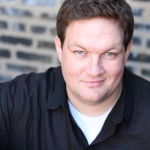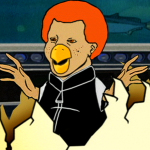Today we’re plumbing the depths with Christopher M. Walsh, author of “Fracture Zone,” directed by Sara Sevigny. Christopher was a Deathscribe finalist in 2012 for “Comparing Notes at the End of the World.” He is a company member with Lifeline Theatre, where he has adapted “The Count of Monte Cristo,” “The City & The City,” and “A Tale of Two Cities” with a fourth (“Soon I Will Be Invincible“) coming this spring. He also acts. We’ll be talking with Christopher about formative experiences, Russian history, and What Scares Him.
How did you get into horror?
My very first experience was when I was eight or nine years old. My parents were watching Ghost Story on TV. I had been told I couldn’t watch it because it was too scary. I was bored in my room, so I wandered into the living room right at the moment that Alice Krige’s face transforms into this corpse-thing and gives Melvyn Douglas a heart attack. That fucked me up for life. I still can’t watch scary movies.
But then a few years later I read my first Stephen King story (“The Mangler,” from Night Shift) and I thought, “I wanna do something like that.”
What excites you most about writing horror, compared to other genres?
There’s something fun about creating a thing that makes people look at you and ask, “What’s wrong with you?”
What was the hook for you in this story? What came first, the story or the sound?
The sounds came first. So much about life on a submarine is about sound that it seemed a perfect setting for radio play. I thought of the Russian submarine, the Kursk, that sank in 2000. When divers reached the sub and got inside, they found letters the sailors had written in the dark, in the few hours between the sub landing on the ocean floor and running out of air. I have nightmares about what those hours must have been like.
Plus, the deep ocean is a concept that unnerves me. We’ve sent machines into the far reaches of the solar system and beyond, but something like 90% of the earth’s seabed remains unmapped and unexplored. It’s a part of the world described with terms like “fracture zone,” and “abyssal plain.” There’s something downright Lovecraftian about that.
What do you consider the biggest challenge in writing for “radio,” compared to traditional theatre?
Indicating action without using clunky expository dialogue. Most of my rewriting time was spent fixing that kind of stuff.
What sound would you most like to see/hear performed in a Deathscribe piece?
Children’s laughter – especially when you can’t actually see the children – is a particularly unsettling sound.
Do you have any advice for aspiring Deathscribes?
Let the audience’s imagination do the work for you. Describe the sounds you want to hear as clearly as you can, make your characters’ reactions genuine, and the audience will fill in the blanks.
What scares you?
Tight spaces, religious conservatism.
Christopher will make you want to curl up and pray when we unleash “Fracture Zone” at The Mayne Stage Theatre this December 1st!
^_ _^ .~T~

